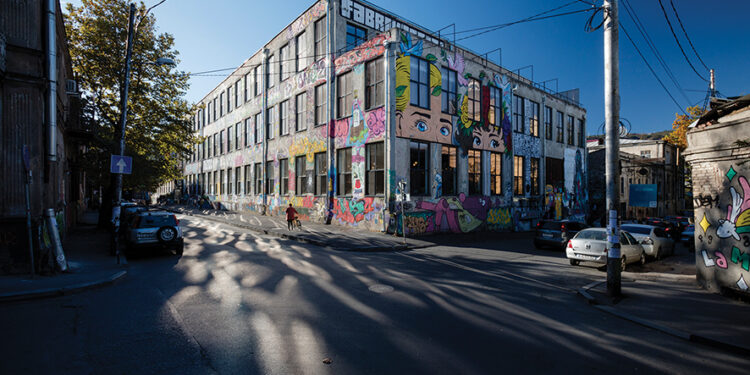As part of a global effort to promote sustainable urban living, Tbilisi Circular Labs (TCL) is launching its first two reuse system pilots in June 2024. The project, implemented by CENN with the support of GIZ and ICLEI, is one of four “Circular City Labs” globally under the GIZ Circular City Labs – Testing Reusable Packaging Systems in Cities initiative. The goal is to reduce greenhouse gas emissions by scaling viable reusable packaging systems, while also strengthening the role of women and female entrepreneurs in local circular economies.
Following a business acceleration program held from July to September 2024, two businesses were selected to launch pilot reuse models: Fabrika, a multifunctional urban space, and CAMPA, a well-known Georgian beverage company. Both businesses worked with international and national experts to create reusable packaging systems tailored to their operations.
Drinks, Tokens, and a Greener Future at Fabrika
Located in one of Tbilisi’s most visited cultural and hospitality hubs, Fabrika is transitioning all resident bars and restaurants to a reusable cup system. The goal: to eliminate single-use plastic cups, which previously accounted for up to a million discarded items annually. We spoke with Salome Kuprashvili to learn more about the shift.

A new eco-friendly system is starting at Fabrika. What does this mean, and when should customers expect this innovation?
We’re introducing a reusable cup system at Fabrika, which will fully replace single-use plastic. It’s a small change in daily life with a significant environmental impact. The new system officially launches in June. Visitors will be able to enjoy their drinks in reusable cups by leaving a small deposit. After use, they can easily return the cup and get their deposit back. With one simple action, they can actively contribute to positive change.
How does the system work? What is the process like for customers?
It’s very simple: when you order a drink at Fabrika, you receive a reusable cup and a token. You leave a 3 GEL deposit and can reuse the cup as many times as you like. When you’re ready to return it, just drop off the cup and token at any of Fabrika’s locations to get your deposit back.
It’s a circular system: Take it. Return it. Reuse it.
Why did you choose a reuse model instead of recycling?
We’ve been collecting recyclable plastic for years and partnering with Tene, which transforms the material into new products. However, disposable cups present a challenge—separating them for recycling is often difficult, especially when Fabrika is crowded. That’s why we decided to take a step further by introducing a reusable solution. It eliminates the need for recycling and more effectively supports our environmental goals.
Your model relies on user engagement. How does that work in practice?
The user is the key participant in this system. They take the cup, use it, return it—and in doing so, help keep the cycle going.
In many European cities and festivals, reusable cup systems are already the norm. At Fabrika, we’ve often seen guests—both locals and foreigners—ask to refill their drinks in the same cup. So, this project feels like a natural next step. In a space where such environmentally conscious customers gather, this system is relevant and consistent.
How are customers reacting? Are they ready for such a change?
Many guests already preferred using the same cup even before we introduced the system. That tells us the demand was already there. We’re simply making it easier for people to act on their existing habits—integrating them into a system that supports sustainability and becomes part of everyday life.
Do you think society is ready for more eco-friendly solutions?
Today’s consumers care about the spaces they visit—how those spaces reflect their values, show social responsibility, and take real steps to protect the environment.
We believe Fabrika’s visitors are ready. The key now is to turn awareness into action. Environmental responsibility should be easy and accessible. When the system is convenient, participation becomes natural.
What does this mean financially, and is such a system profitable for businesses?
Disposable cups not only harm the environment but also come with recurring costs. Implementing a reusable cup system helps businesses save resources in the long run and strengthens customer relationships. It’s a smart step both financially and ethically.
Bottles, Bins, and a Circular Start at CAMPA
CAMPA, one of Georgia’s most recognizable beverage brands, is launching a bottle return and reuse system in partnership with Tbilisi International Airport and Cavea cinemas. The system involves the collection and return of empty glass bottles to CAMPA’s facility for cleaning and reuse. We interviewed Ana Chkhetia to understand the details of this transition.

What is this partnership about?
At CAMPA, environmental care and strong relationships with our consumers have always been top priorities. These values inspired us to develop a bottle reuse system.
CAMPA juices—known for their unique design and high quality—are widely enjoyed and can be found in many Georgian households. Customers often ask, “Can CAMPA bottles be returned?” This interest has motivated us to take action.
CAMPA bottles are durable and ideal for multiple uses. However, Georgia has not previously had a practical bottle reuse system. To address this gap, we decided to launch a pilot model, which required acquiring technical knowledge, mobilizing resources, and learning from international best practices.
Our collaboration with Tbilisi Airport and Cavea marks one of the first and most important steps in this direction. Consumers will be able to buy our products and return the empty bottles at the same location using dedicated return containers. This is particularly easier with restuarants where customers drink their beverage on the spot and the restaurant can simply collect and store the empty packaging. This initiative is made possible with the support of CENN and GIZ. With help from international experts, we’ve created a system that is environmentally sustainable, easy to use, and economically viable.
How does the bottle return and reuse system work, and why did you choose this model?
CAMPA’s system is simple: partners collect the empty bottles, which are then returned to our factory. There, they are washed using a new, multifunctional machine and prepared for reuse.
The main motivation behind this model is to reduce single-use packaging and promote sustainable consumption.
Why do you think reuse is becoming a global and local trend?
The climate crisis, growing waste problems, and increased consumer awareness are all driving the shift toward reuse systems. In Georgia, this trend is also gaining momentum, particularly among young people and leading businesses that value social and environmental responsibility.
How important are partnerships like the one between CAMPA and the airport?
We hope this initiative will serve as a model for other businesses. Meaningful environmental and sustainability progress requires collective effort. A bottle return and reuse system can’t be implemented by one company alone—it requires logistical cooperation, partner facilities, and consumer awareness. These kinds of collaborations help build circular economy models that are beneficial for both the environment and the businesses involved.
What feedback have you received from the airport? What is their view of the cooperation?
The Tbilisi Airport administration has been supportive of eco-friendly initiatives from the outset. Environmental care and aligning with European standards are top priorities for them. Our collaboration has been very productive, and they see this model as a service enhancement.
How profitable is this system for businesses—particularly for CAMPA?
At the initial stage, the system requires investment—such as bottle-washing equipment and logistical resources. However, over time, these costs are balanced by increased customer loyalty and a stronger brand image. For CAMPA, this initiative is strategically, environmentally, and marketing-wise a sound decision.
What are CAMPA’s future plans? Will there be expansion, new products, more partners? Will you collect bottles directly from customers?
Yes, we plan to expand the system to more locations. We’re also working on introducing new flavors and functional drinks in response to evolving market trends. In the future, we plan to implement a direct bottle return system for consumers.
We aim to make the return process simple and accessible. As an environmentally responsible company, our mission is to use resources efficiently and reduce environmental impact. We hope our initiative will be positively received.
Some people may be skeptical about reused packaging. How does CAMPA ensure hygiene and safety?
CAMPA has implemented strict hygiene protocols at our factory, including thorough washing, sterilization, and quality control for every glass bottle. Only bottles that meet our high standards are approved for reuse, ensuring safety and peace of mind for consumers.
Tbilisi’s Circular Future in Action
With these two pilots, Tbilisi Circular Lab begins its mission to test and promote reusable packaging systems in real-world urban settings. As part of a global GIZ initiative, the project not only addresses waste and emissions but also encourages systemic cooperation across business, government, and civil society. By supporting models that are both economically viable and environmentally sound, TCL is helping lay the groundwork for a more circular and sustainable urban future.
With the financial support of the European Union, within the framework of the large-scale project “Circular Cities and Regions in Georgia”, CENN, in cooperation with ICLEI Europe, continues to work on promoting waste management, the implementation of circular economy principles, and the culture of sustainable resource consumption in Georgia.
The project aims to strengthen climate resilience and support a just transition in the country by fostering waste reduction and advancing circular economy planning and implementation.
By Kesaria Katcharava














